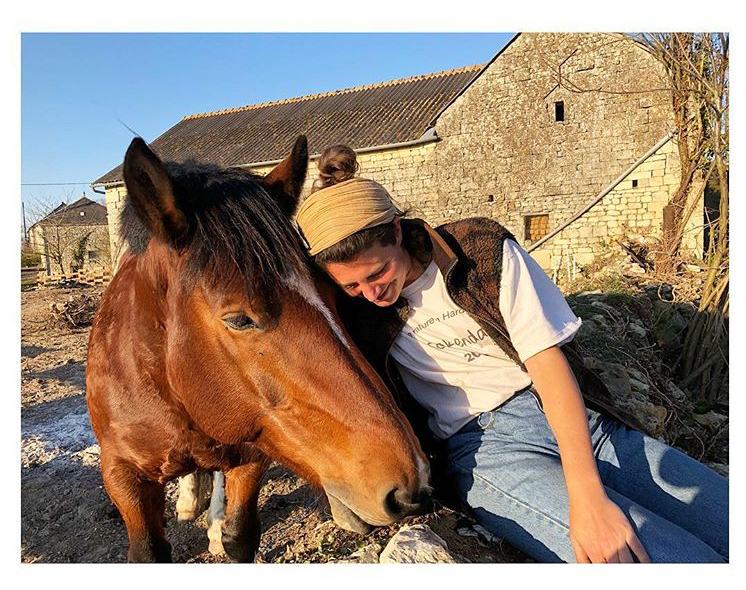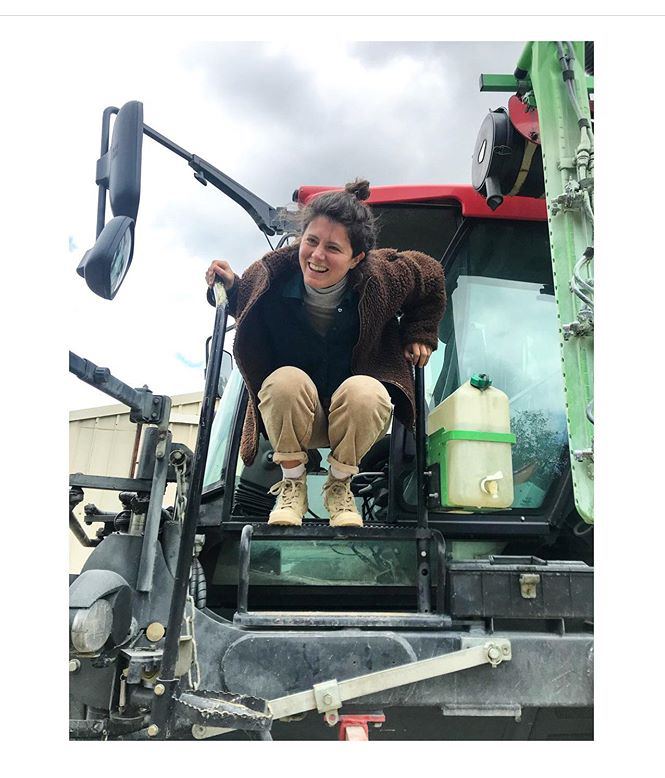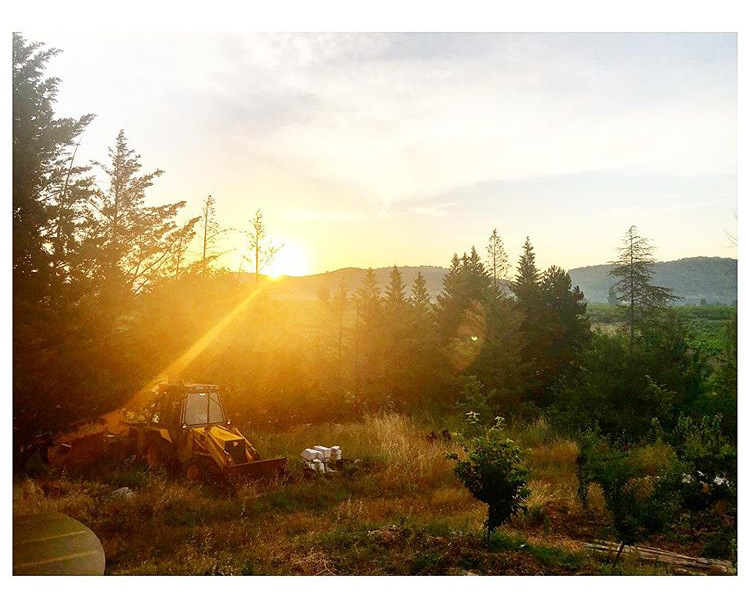A Personal A to Z

Since I started in Banyuls in April, I’ve slowly been moving back North, going where the work flows, living out of a bag while I learn on the job, which means there’s been less time for all those books than I first thought. And that’s ok. I figure what they say, and what these words actually mean when they’re your day-to-day, is bound to be different enough not to matter a huge deal anyway.
I doubt, for instance, there’s been much written about how tedious the work can be. The same goes for the hassle of barrels or how much plastic is used even by the most environmentally-respectful of the industry. And I have found no mention of the importance of improvisation, nor how yoga should be mandatory.
But it doesn’t matter. The truth lies not in guides but in hard-to-reach tick bites. Not in the theory but in the actuality of three months of pruning and the resulting knots in your back. So here is a glossary of words you may already know, but with definitions you may not recognise; an A to Z based on my experience of what learning to make wine really means:

A is for the Ardèche, where I’ve been based since last June and for all the alcoholics I’ve met since on my travels from Anjou to Banyuls.
B for those not-yet-alcoholic-but-borderline and the toothpaste-top twisting factory type boredom of bottling and barrels and ‘bane’ as in ‘barrels are the bane of my life’ and that other universal condition in winemaking: bad backs and how working in the Beaujolais is your fast track to one.
C is for how all your clothes smell like copper come summer and for cash flow forcing you to sell before you should (see Y) and for campervan and how it’s taken me less than one year to go from “Me? Are you crazy?” to considering buying one because the alternative is crazier (I stayed my first two months in the unfinished barn of a Czech and washed dishes in a grape caisse and this winter in a sort of commune where I slept in a troglodyte cave) or at least less comfortable (many weeks on a couch). But C’s not all bad because there’s also casse-croûte: the time ‘round 10 we drink a coup, the candlelight in which I spent most of my daylight hours in a very special cellar labelling with a paint bush, and my favourite French onomatopoeia ‘click-clack,’ the name for a hand-press derived from its sound.
D stands for the dual responsibility of all stagiers: taking density, and décuvage the latter of which translates to de-shoed and de-socked, up the dangerously extended ladder into the tank over the top you hop to shift X tonnes of grapes without breathing in the CO2 or you might die, here’s a pitchfork. It also stands for dancing and how, now I live in the middle of nowhere, I too hope this is what a dégustation will dissolve into.
E stands for the 8,50 euros I take home an hour which, just for fun, let’s compare to the £80 I can’t afford to pay for something my sweat’s in just because it got to London and for energy as in, “Where does a wine’s energy come from?” No one seems to know. It also stands for ébourgeonnage which is the technical term for picking out the unwanted buds and when (’round about now) the winemakers for whom I pruned will see how much I got wrong.
F stands for the increasingly frequent frosts in the north and for all the times I wonder if chasing after nature is not a fool’s errand and for all the fun my friends back home seem to be having whereas sometimes I feel I’m stuck in France which, F.Y.I, if you ever move to, make sure not to have a foreign licence plate. Trust me, it helps.
G stands for Goblet pruned vines and how this is traditionally how they prune Gamay in the Beaujolais which I say not as trivia, but to draw your attention to gruelling efforts of those who work there considering how the vines don’t grow much higher than 60 cm off the ground (see B for ‘backs’). It’s also for gravity, a force as fundamental as it is easy to forget and place your tank not nice and high but on the floor; and for gymnastics which you get rather good at with all the scrabbling out of the tanks you don’t fit through the hole.
H is for the letter the French cannot say resulting in a change of my name and how I was quite unexpectedly overcome by the harmony between man and land when he works with horses, but how I remain annoyed by all the hoo-ha the trade makes about grapes being hand-harvested while not mentioning all the other hand-work we’ve been doing the remaining 11 months of the year. It also stands for hoses and the untold hours I’ve spent coiling, uncoiling and cleaning them, and for the hail that wipes you out in July.
I is for improvisation which, along with cleaning, is another cellar truism I feel has been deemed not romantic enough to talk about, and for incremental which, when everyday you’re outside in the same place at the same time, is how you experience the slightest shifts of the seasons. It’s also for how irritating it is trying to learn a language with people talking in inverse (‘verlan’) as well as the soil-born bacterial infection I’ve had living in my index finger since February and how the impossible zigzagging of French bureaucracy means I pray nothing more serious will happen because I don’t have health insurance.
J stands for that other French lingual fascination ‘jeu du mots’ while we’ll use K for the permanently knotted state of my back as well as for the knife you’ll need to carry if you want to fit in with everyone else in the vines (and how these, like dogs, I’ve found hint at their owners’ personalities).

L is for labelling, another occupation of the stagier and one, unfortunately, that doesn’t happen just once a year (and not always with a machine). It also stands for leak, as in your tank’s leaking like mine has been slowly, silently, for weeks; and for lyme disease, a very, very real and serious risk.
M stands for “Any recommendations for music that sounds good through one earphone?” and midi, the time every service and office closes despite it being the only time off you’ve got now it’s the nationally-enshrined hour for lunch. It also stands for manure, which in places you can’t reach with tractors or horses you spread with your hands from metal buckets strapped across your belly, and for the moon which I have a new appreciation for ever since the day it was too close to Earth for us to prune and we had the day off.
N stands for ‘nettoyer’, ‘to clean’ in French, which, after you’ve spent all year playing catch up in your vines, is the other thing making wine is about. It also stands for no money (ditto) and ‘negocé’, the merchant-model I feel vignerons are often quick to distance themselves from while at the same time being registered as one ‘just in case’.
O stands for ouillage, the phenomenon I forgot when I filled each of my containers for vinification to the brim leaving none spare to top up. It’s also for oxidisation to which my first wine has lost its aroma (see ‘ouillage’) and most of its taste; and oïdium, the powdery mildew we spent six hours a day over two months picking out before the two months two weeks later we spent picking grapes.
P is for plastic! Winemakers use a lot of plastic, and for peeing outside which I do more than in. And then there’s ‘pioushing’ which is how on your knees blow by blow, plant by plant we keep the vines weed-free, and pruning, the, “So you think you want to be a winemaker? First wait until you prune”-elephant in the room. I’ll admit: I thought I’d hate it, all the pain—physical, psychological—without the gain of harvest. But: podcasts!
Q for how quickly things only one year ago I thought exceptional have normalised, while R stands for repetitive, the name of the winemakers’ game; and for the broken bits of Roman pottery it’s illegal to search for but one finds here anyway (See ‘pioush’).
S is for ‘stagier’ which means intern but sometimes also translates to ‘no pay’. It stands for sun, which, even as someone from the north I no longer sit in, and for sieves and bathing suits: two everyday things you might not expect to be so important in the cellar. Much less everyday are the winemakers who spray seawater as an alternative to copper, and tasters with enough sensitivity not to immediately “identify” ‘souris’ before considering the wine may have only been bottled for their benefit yesterday. And while we’re on the subject of salons and standing behind a table all day smiling and saying the same thing on repeat: these are hard work! Have pity! (Also, see ‘dancing’).
T is for toenails and how mine are still stained from all the foot-treading of grapes last year and for everyone’s tobacco-stained teeth. It’s for the toilets I’ve never seen in a cellar and for ‘tirez le bois’ which is the term for pulling (then burning) the wood you’ve pruned off the wires, and how this is when you’ll hurt your back if you haven’t already. T is also for terrifying which is what it is to be told ‘Now you try’ after only two examples of pruning; for ‘transpallet’, the wheelie thing Amazon employees and winemakers have in common, and the thing no winemaker has: time and the oodles of it I’ve spent in the dark armed with a head-torch and a teaspoon teasing grape seeds out of the press.
U is for the unemployment benefits French vine workers treat as extra income and undervalued in the context of me wondering how one can put a price on a bottle that took unlimited hours to make.
V is for village life and how this means violation of your private life and for ‘valley mentality’ and how this sets in quicker than you might think. It stands for vendange and vinification, each an event that costs enough energy to justify their happening at a separate time, and for the acute lack of vegetables in French cooking. V also stands for ‘vrille’, the vines’ feelers that are more like iron pipe cleaners and how they drive me mad the way they cling to e v e r y t h i n g, and for VdF which, frankly, doesn’t mean s***.
W is for what everyone thinks your new life in the south of France is like vs. what it’s really like which can be boring and lonely and is most of the time extremely windy, and for how I’ve been warned it’s a bad idea to drink water out of the tap for all the chemicals in heavily farmed areas. It’s also for the weight I’ve put on from the near non-stop wine, bread, various consistencies of pork fat and cheese, and all the weed seeds being airmailed out of Amsterdam.
X stands for ‘xadic’, Catalan for the pick-axe type tool you use to break rock and dig out lavender bushes known in the hand-worked terraces of Banyuls merely as ‘weeds’.
Y is for “Guys stop! We’re drinking wine way too young” and for yeast and how these can be attributed personalities like ‘lazy’ and the yurt I saw myself living in during this life chapter but am not, only for there to be someone living in my garden who is.
Z for zero-zero and how a year ago I couldn’t taste the difference between this and ‘just a little’ and how — and this is a bit of a problem — it’s increasingly difficult to go back.


Did I think I would make it to Z without getting just a wee bit bored? Perhaps. But I could read this again and again and still be captivated.
Hannah your Mom sent me the link. It is the most fascinating and interesting piece of writing I have read all year. You must turn it into a book. You are a natural born writer and creative genius. Keep on girl, you are going great guns. By the way do you know the musician Lucinda Williams? She is your musical equivalent. Listen to her while picking those grapes!!
Much love, Julia (mother of Harriet contemporary of Jess ex Fairwarp remember me? ) XXX
oh dear have I messed up? I thought I had already left a comment? If you need another it is BRAVO BRAVO BRAVO
You are brilliant Hannah- come and see us in the South West!
I usually don’t rave about wine-vine related articles, being on the « producing-badback » side of the natural wine thing, but i laughed many a times reading this and recognized MUCH of it as my quotidien. *excuse my french*
Great insight into what most of wine making Really is.
Bravo -annah! (an impossible name indeed for the french to pronounce)